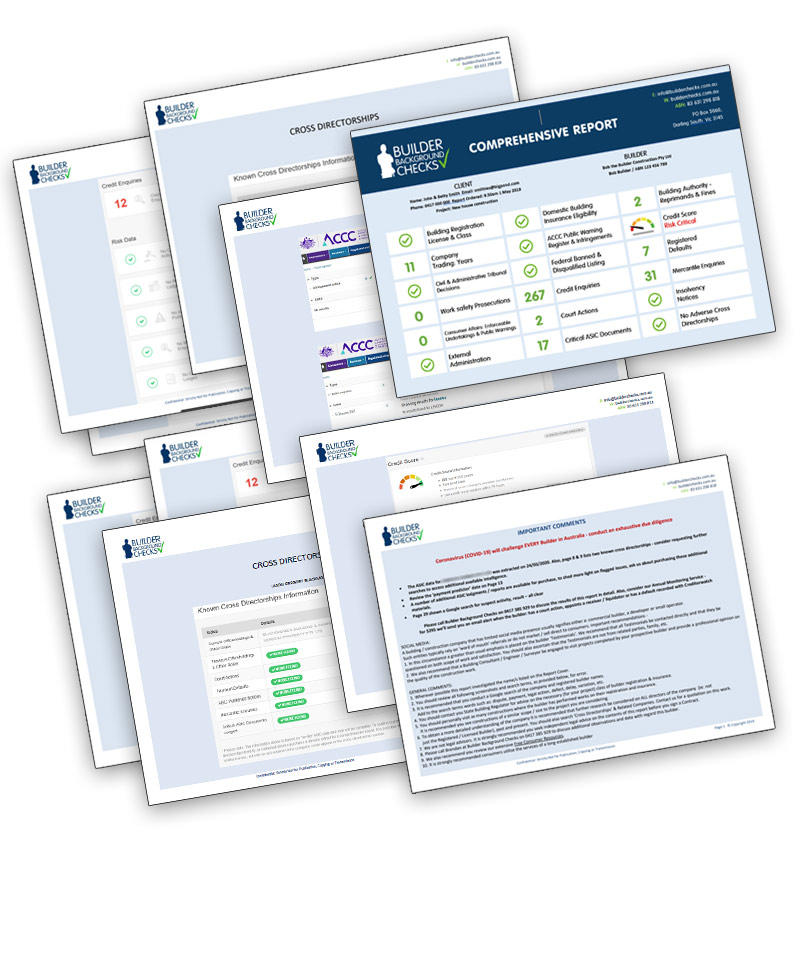Avoid These When Looking for a Builder
First things first, far too many people rush the process of choosing a builder. Builder selection is the most important step in a building project. Slow down, it’s not a race.
1: Appointing a Builder Who Isn't Properly Registered / Licensed or Insured
Your builder must be registered with the State Building Regulator (links at bottom of our homepage). There are also multiple ‘unlimited’ and 'limited' registrations as well as builder 'classes' (eg: domestic, commercial, demolisher, structural landscaping, pool builder, etc). It's essential your builder's registration is appropriate for your specific project. If the work completed hasn't been done by a correctly registered builder it is illegal.
Additionally, depending on the State where you live, there are mandatory insurances. No matter where you live, builders are compelled to provide some form of consumer protection to protect you if things go poorly. Check with your State Regulator as to what the mandated insurance are - know your rights - don't rely on others.
Also, don't confuse State mandated building insurance with other kinds of insurance. Even if your builder says 'it’s OK, I’m covered’ or that they ‘have insurance’, they may not necessarily have the compulsory cover. Ensure your Building Inspector, Surveyor or Council confirms that all policies are in place before works begin. NB: It's essential you have a physical or digital copy of the mandatory insurance before you allow the project to commence.
Builders should also hold a range of additional insurances such as: public liability, contract works insurance, theft, etc. Also, by law (determined by State regulation) you must have a written major domestic building contract – only registered / licensed builders can complete these contracts.
If you use an unregistered builder, without insurances, mandated contracts, permits, etc, you have a major problem - serious penalties apply.
2: Only Getting One Quote
Your new home, extension or renovation may be one of the largest financial undertakings of your entire life, don't rush the quote phase.
Get as many quotes as possible. Five or six is far better than one or two. Granted, it can sometimes be difficult to obtain quotes from builders - particularly now - we strongly recommend that you persevere.
Homeowners can also be shocked by large variations in prices provided by builders. Be aware that some operators aren't keen for the work and inflate quotations. The only way to benchmark the cost of your project is to obtain several quotes from the same drawings.
Investing time now to assess prospective builders will pay off in the long run. See: Builder Quotes: How to Avoid Unanticipated Cost
3: Signing a Contract You Don't Understand
Too many people sign a contract without understanding what it means. Never sign a contract without having an independent lawyer – specializing in construction law – assess the documentation.
The reality is that there are several thousand new formal building disputes recorded in Australia every single year. These disputes slowly churn through a range of courts and dispute resolution processes; it’s stressful, slow and expensive. This is why most families usually only ever undertake one major domestic building project in their lives.
Be aware also that when a significant building dispute occurs, work often stops on your site. The owner suffers the delay, the builder simply moves onto the next job. Terminating a contract after works have begun is generally difficult and expensive. Keep in mind also that few builders are prepared to finish incomplete works – it’s far better to get the contract details right in the first place.
4: Signing a Contract 'On the Spot'
Don't let builders or their sales staff rush you. Pressuring consumers to sign a contract or pay a ‘holding deposit’ to secure a ‘special discount’ is unprofessional and often leads to bad outcomes. Please take your time. See here for tips on Where to Find a Good Builder
5: Giving in to Pressure Tactics
Some builders use unscrupulous sales tactics that may not technically break the law can cause significant financial pain. Unethical tactics are a sign of a business not competing in the marketplace on its merits. If you're feeling pressured to hand over a deposit, or sign a contract on the spot (which is illegal in some States) because you're told ‘material prices go up next week’ or if you’re offered a 'free solar panel' or anything ‘for a limited time’ – you should be skeptical.
Finally, ethical builders will promote the merits of their expertise and past successes, they will not denigrate other builders.
6: Becoming an Owner Builder
Be extremely wary of so-called builders who ask you to become an ‘owner builder,’ or builders that suggest that you arrange the building permit (and they do the building works). Throughout most of Australia, only registered or licensed practitioners can obtain a permit. This request may be a sign that: the builder doesn’t have registration, their registration has lapsed or has been disqualified - stay away from these operators.
7: Choosing the Cheapest Quote
If an offer seems too good to be true, it usually is. If you gamble on the irresistibly low quote don’t be surprised if you get delays, variations and poor workmanship. In many instances too-low quotes are later proven to have left aspects of the project out or have underestimated the labour required to complete the build. If you contract isn't bullet-proof this then leads to a dispute, and very often the homeowner ends up having to pay more than they've budgeted.
by Brendan Watkins
We've helped hundreds of Australians complete their due diligence with our unique range of credit rating, defaulting, company & court records. We also search hard-to-find regulatory, insurance, social & government records to ensure our clients avoid repeat-offending builders. If you're about to build, or extend credit to builders, we'll do your homework for you.
Disclaimer: Builder Background Checks P/L (BBC) provides advice of a general nature only. BBC does not provide formal legal, regulation or building advice. The advice published has been prepared without taking into account your specific objectives or needs. Before acting on any commentary, articles or reports provided by BBC you should consider their appropriateness to your specific objectives, financial situation and requirements. BBC shall not be liable to any party as a result of any information, services, or resources made available as part of its reports or articles contained on this website.

